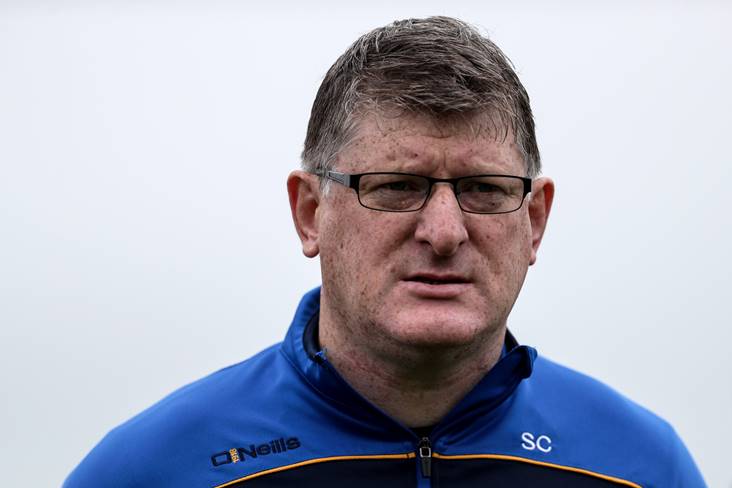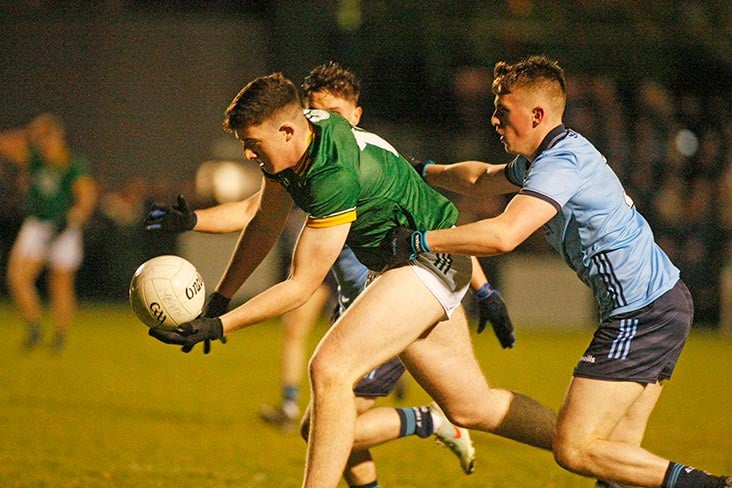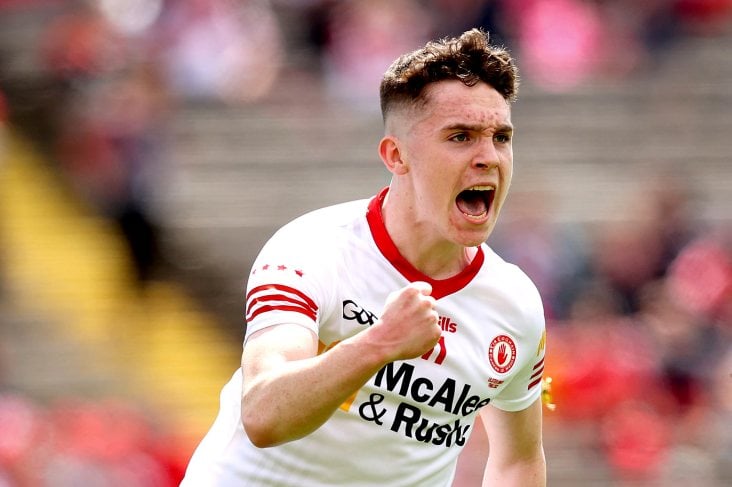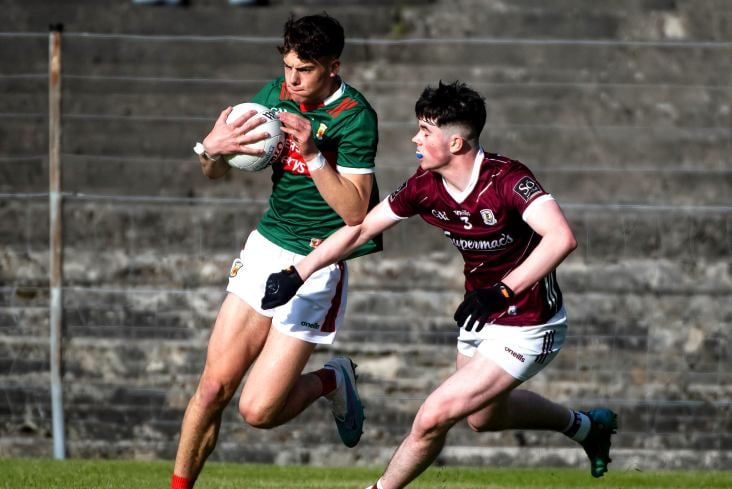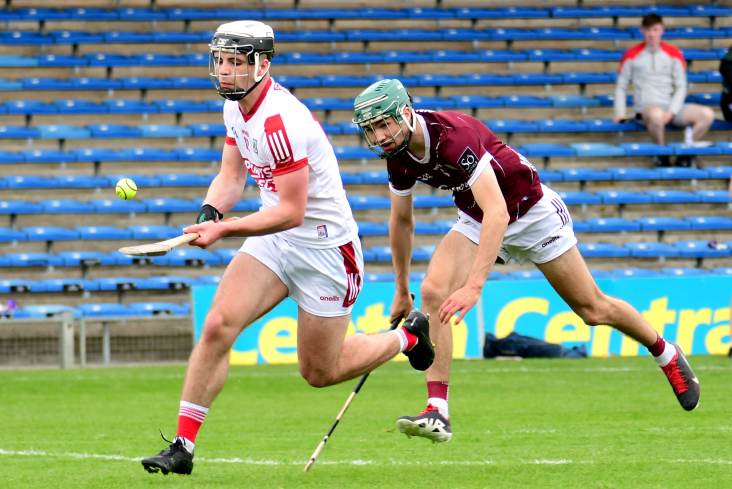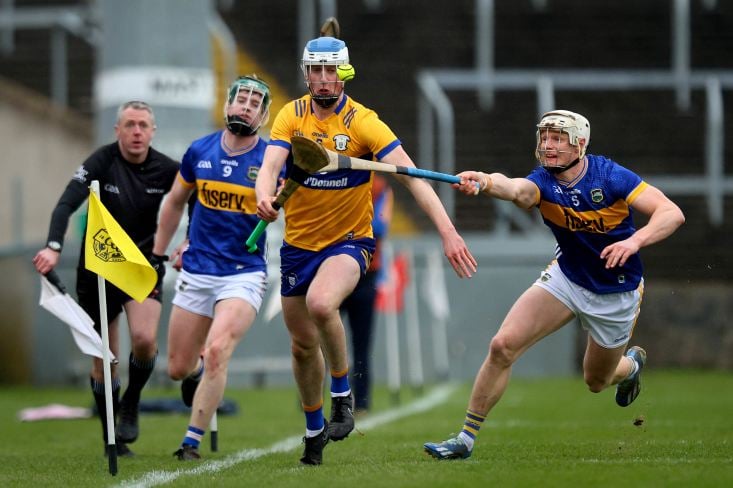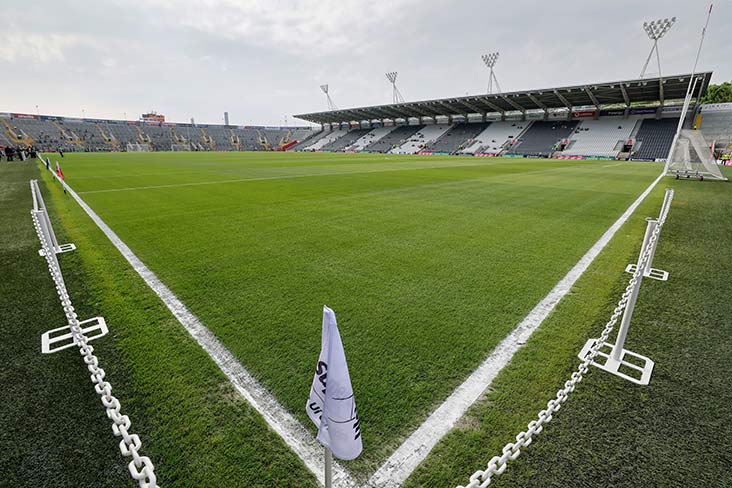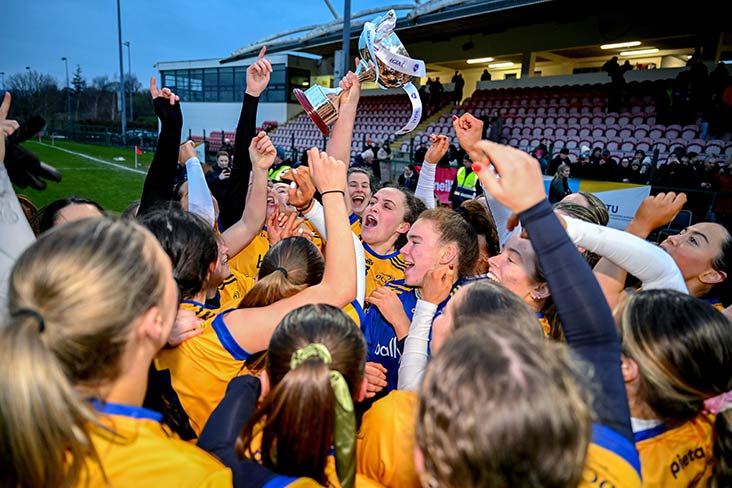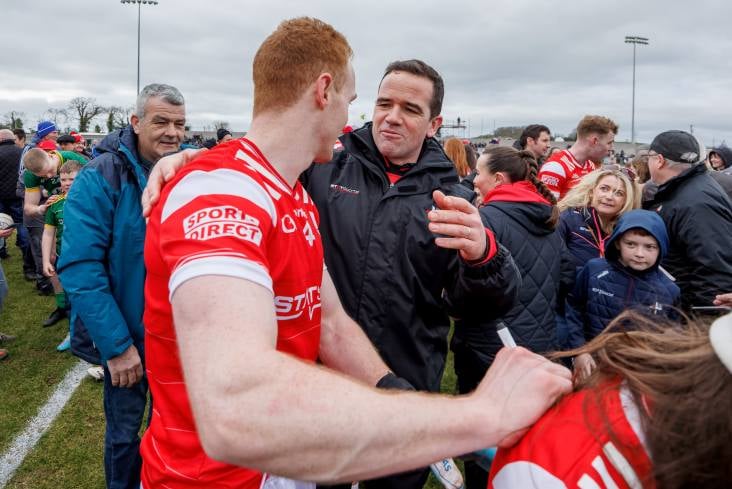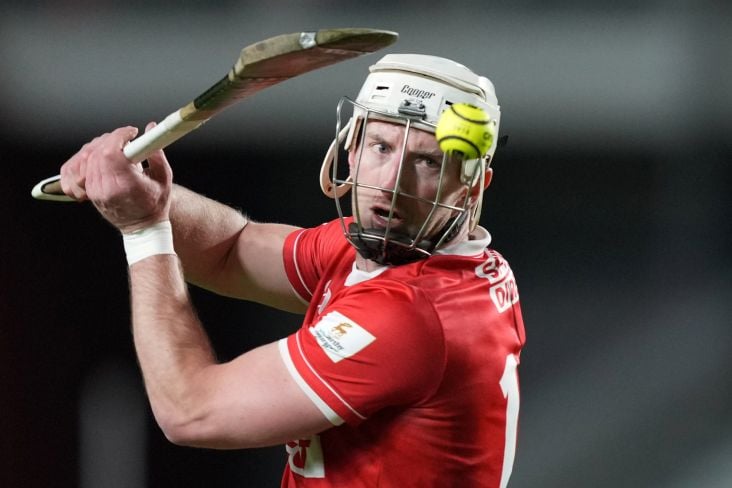Cavan great Mick Higgins dies at 87
January 28, 2010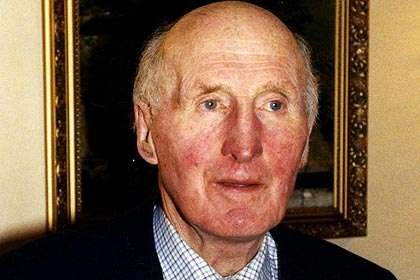
The late Mick Higgins
Higgins was a member of the Cavan side which made history by winning the 1947 All-Ireland SFC final against Kerry in New York at the Polo Grounds.
Born in New York, he returned to his mother's native town of Kilnaleck in Cavan when he was five years old and went on to play for the club before moving to Mountnugent, with whom he won a Cavan SFC title with in 1946.
Higgins played in his first Ulster championship game for Cavan against Monaghan in 1943, winning his first senior provincial medal in that same year. Four years later, he went on to represent Cavan in their memorable win at the Polo Grounds and helped the Breffni County to retain their All-Ireland title 12 months later against Mayo.
The following year, Cavan were denied their bid for the three-in-a-row by Meath, but three years later Higgins and Cavan would gain revenge over their neighbours by defeating the Royals at Croke Park.
Cavan have not appeared in another All-Ireland SFC final since 1952 when Higgins captained them to the Sam Maguire Cup.
His death means that Owen Roe McGovern, who now resides is New Jersey, is the sole survivor from Cavan All-Ireland winning teams of 1947 and '48.
*********************
CAVAN COUNTY BOARD PAY TRIBUTE TO FORMER GREAT
On behalf of Coiste Chontae an Chabhain, Chairman, Officers, players and clubs, we would like to extend our deepest sympathy to the family of Mick Higgins who died earlier today.
Mick was a wonderful ambassador for Gaelic Games not only in Cavan but indeed throughout the country. He was known and cherished the length and breadth of Ireland.
A quiet man, Mick was always a thorough gentleman. He was arguably Cavan's best known player during a golden period when Cavan were the king pins of Gaelic Football.
Mick's inter county playing career spanned two decades and during that period he won many honours including 3 All Ireland titles, 1 National League title, 7 Ulster Championship titles, 2 Railway Cups and 2 McKenna Cups. He was the captain of the last Cavan team to lift the All Ireland in 1952.
He managed Cavan during the early 1960's wining 4 Ulster titles and was involved with Longford during its most successful period in the late 60's. He acted as advisor to Donegal in 1972 when they won there first Ulster title. He also refereed officiating at both provincial and national level.
Ar dheis de go raidh ah anam dhilis.
The funeral arrangements for the late Mick Higgins are as follows. He will be reposing in his home until 6pm Friday evening 29th. House strictly private please after 6pm. Remains leaving his house at 7.45pm, arriving at Mary Immaculate Chapel, Virginia for 8.15pm.
Funeral mass the following morning Saturday 30th at 12 noon. Burial afterwards to the adjoining cemetery.
*********************
AN EXCERPT FROM HOGAN STAND MAGAZINE FROM MARCH 2007
Glorious times
31 March 2007
Sixty years on and Cavan's All-Ireland SFC triumph in the Polo Grounds of 1947 is in danger of becoming a fading milestone in the history of Cavan GAA. Cavan hero Mick Higgins helps keep the story alive in the company of Kevin Carney.
Back in the middle part of the last century, Gaelic games followers in America were beating a path to Croke Park in the hope of seeing the creme de la creme of players strutting their stuff in a meaningful way in New York.
After petitions were turned down year after year at the GAA's annual Congress, gaels Stateside eventually got their way and the juxtaposition of Cavan and Kerry at the Polo Grounds in 1947 answered the prayers of, not least, one of the main advocates of the novel meeting, Canon Hamilton of Clare.
Mick Higgins was one of the stars who graced the Polo Grounds in the All-Ireland SFC final of '47 but, interestingly, it was the Breffni blues' penultimate round game against Roscommon that the now Virginia resident remembers most.
The duel with Roscommon in front of 60,000 fans was an intriguing affair but even before it took place there was a distinct air of anticipation and expectancy among the opposing camps.
There was, after all, the prospect of a trans-Atlantic trip for the winners with the same carrot being on offer to the other semi-finalists in 1947, namely Kerry and Meath.
"We all knew what was at stake and the idea of travelling across to America was very appealing but we tried not to take our minds of the game," Mick explains.
"We always felt it was going to be difficult to beat Roscommon and that was the way it worked out.
"Overall I'd say our performance against Roscommon in Croke Park was the best one we put in that year.
"We were two evenly-matched teams and it was a close contest.
"They went into the game as favourites because they had beaten us the year before when they had much the same team that won the All-Irelands in '43 and '44.
"They had won the All-Ireland minor too in 1942 so they had a lot of very good footballers at their disposal around the mid-forties."
Reflecting on the best the west had at hand then, Mick says Roscommon had "a good all-round team" but the likes of Brendan Lynch and Bill Carlos in defence were outstanding footballers while up front the Connachtmen had star men in Hughie Murray and Donal Keenan.
The significance of Cavan's 2-4 to 0-6 triumph over such stars wasn't lost on our man Higgins or his team-mates at that point in time.
"Roscommon were a highly-rated team back then and beating them gave us a lot of confidence.
"We were playing good football in the run-up to the match but they had by far the better start in the game though.
"At one stage in the first half they were well in front after we had a bad start. I remember that we only had two attacks in the early stages of the first half and two points is all we got by half-time."
It must have been good to listen to Cootehill clubman and Cavan trainer Hughie Reilly along the sideline?
"I'm sure Hughie knew there was a lot more football in us than what we had shown for most of the first half and I myself felt they wouldn't play nearly as good in the second half of the first half.
"We had a lot of work to do to turn it around but we managed to do it which left Hughie in a lot better mood."
One wonders what was the general mood in the camp during the interval?
"I felt the mood was good among the players because we had a good lot of the play up before half-time and, if anything, we had the psychological edge going out for the second half."
In the other All-Ireland SFC semi-final of '47, Kerry, as expected, comfortably defeated Meath by 1-11 to 0-5 and so book their place in the decider.
Preparations by the Cavan team for the historic meeting with Kerry at the Polo Grounds were way ahead of their time and utterly professional.
"Hughie had us super fit by the time the final came around," Mick recalls.
"We trained at different venues in the 'forties. It was either Kilnacrott, Crossdoney, Ballyhaise or Ballyjamesduff but in '47 it was mostly in Mountnugent, the club Peter Donoghue, Tony Tighe and myself played with before playing a bit with Kilnaleck," adds Mick who, interestingly, played minor club football in Louth and Kildare.
Curiously, the Cavan and Kerry parties travelled by different means to New York.
The Cavan party mainly travelled by air, while their Kerry opponents opted to travel by sea.
"The reserves and the officials travelled by boat but the players went by plane," Mick explains.
"Unfortunately with delays and one thing and another it took us 27 hours to get there whereas nowadays you'd do it in seven hours."
How did you find the flight itself?
"Well I think like everyone of the players, it was the first time I'd been on a plane and I wouldn't say I was afraid but you'd be inclined to be a bit nervous all the same!"
The would-be triumphant Higgins and his team-mates would later comment on the advantage of travelling by air though as it gave them more time at home with their training and preparation for the final.
The Kerry party on the other hand had a much longer journey travelling by sea.
The historic game was played on the 14th September in the Polo Grounds, New York, home of the New York Giants Baseball team, on a bone hard dry pitch in blistering sunshine.
"It was a very hot day in New York for the final and it got even more roasting as the day went on. The football was fast too and you could feel the energy being sapped from you," adds the retired Garda sergeant. Kerry took the sensible precaution of wearing white, jockey-type caps as protection against the blazing sun and built up a commanding eight-point lead against a rather nervous Cavan side.
The lead would have been much greater if two Kerry goals had not been disallowed and frees given instead.
It looked like an easy Kerry victory but then a switch by the Cavan mentors which saw PJ Duke revert from midfield to his usual wing back position alongside his captain John Joe O'Reilly and Simon Deignan saw an immediate tightening up of the Cavan defence and this changed the entire pattern of the game.
"We got all the praise after we won the match but a lot of credit must go to the management because they helped turn things around," says Mick.
Grega O'Connor got through for the second Kerry goal while Cavan eventually got off the mark with a Peter Donohue point.
Columba McDyer added a second Cavan point before Kerry edged further ahead with excellent points from Grega O'Connor and Paddy Kennedy to put the Kingdom well in command.
The Cavan mentors then made the crucial changes which were to have a profound impact on the game.
Cavan upped the ante and renewed Cavan pressure began to tell on the Kerry defence.
The bold Higgins, Tony Tighe, Peter Donohue, Joe Stafford and T.P. O'Reilly began to get the scores to whittle down the early Kerry lead.
By half time Cavan had forged ahead on a score of 2-5 to 2-4 with Mick bagging a vital goal to help Cavan eventually win the game on a score of 2-11 to 2-7.
The closing minutes were packed with tremendous excitement as Cavan led by only a single point with five minutes remaining, but the younger and faster Breffni side ended strongly with three points from Donohue (free), midfielder Phil Brady and Higgins.
It must have been some experience?
"It was a great experience but, funnily, the Polo Grounds hadn't nearly the atmosphere of Croke Park even though there was around 35,000 people at the game," Mick opines.
"But who knows, maybe we wouldn't have won the Sam Maguire if the final had been played in Croke Park!"
The 85 years young Cavan football legend predictably admits that his 1947 final medal is his prized possession and afforded him that bit extra sweet memory although he'd never belittle the achievements of 1948 and '52.
So what effect had the Polo Grounds success have on the people of Cavan in general?
"It was tremendous for the whole county; gave everyone a lift at a time when there wasn't anything else much other than football.
"We had a great time ourselves and it was great to give the county something to celebrate."
The gaels of Cavan and the GAA itself have reason to be eternally grateful to Mick Higgins and everyone associated with the Polo Grounds in 1947. Tweet
